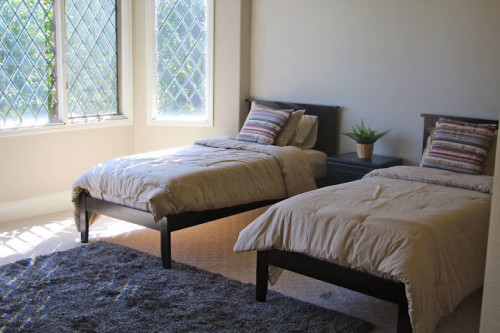






Evolve Teen Comprehensive DBT Treatment Center - Aura
Treatment Focus
This center treats substance use disorders and mental health conditions. You'll receive individualized care catered to your unique situation and diagnosis, learn practical skills for recovery, and make new connections in a restorative environment.
Primary Level of Care
Offering intensive care with 24/7 monitoring, residential treatment is typically 30 days and can cover multiple levels of care. Length can range from 14 to 90 days typically.
Claimed
Recovery.com has connected directly with this treatment provider to validate the information in their profile.
Treatment Focus
This center treats substance use disorders and mental health conditions. You'll receive individualized care catered to your unique situation and diagnosis, learn practical skills for recovery, and make new connections in a restorative environment.
Primary Level of Care
Offering intensive care with 24/7 monitoring, residential treatment is typically 30 days and can cover multiple levels of care. Length can range from 14 to 90 days typically.
Provider's Policy
Evolve works with most private insurance companies on an in-network and out-of-network basis. We talk to your insurance provider and advocate for you to maximize your benefits at every level of care.
Evolve Teen Comprehensive DBT Treatment Center - Aura
Evolve Teen Comprehensive DBT Treatment Center - Aura
About Evolve Teen Comprehensive DBT Treatment Center - Aura
Evolve Aura is a comprehensive residential treatment program that offers personally tailored treatment with solution-focused and evidence-based methods for up to 6 teens aged 12-17 at a time. Situated in spacious and luxury homes, clients have access to private or shared rooms, nutritious chef-prepared meals, computers to participate in 2 hours of schooling Monday-Friday, and amenities such as a pool, fitness center, onsite chef, and outdoor lounge space. Their facility is licensed and staffed 24/7, offering clients a safe and structured therapeutic environment conducive to healing. Their dual-diagnosis program specializes in the treatment of mental health, addiction, and co-occurring disorders using a combination of methods including group therapy, family therapy, motivational interviewing (MI), cognitive behavioral therapy (CBT), and dialectical behavior therapy (DBT). As part of a thorough admissions process, experienced clinicians provide an extensive and thorough assessment which results in clients receiving a personally tailored treatment plan that is regularly monitored and updated as needed to meet each teen’s unique treatment needs and goals.
Dual Diagnosis
Evolve treats a wide range of mental health disorders, substance abuse disorders, and co-occurring disorders.
Mental health and behavioral disorders include anxiety, depression, self-harm or suicidal ideation, post-traumatic stress disorder (PTSD) or trauma, bi-polar and other mood disorders, gender dysphoria, disordered eating, borderline and other personality disorders, mood or behavioral dysregulation, obsessive compulsive disorder (OCD), and psychosis.
They offer comprehensive treatment for substance abuse disorders including alcohol, cannabis, opioids, prescription medications including stimulants or sedatives, synthetic drug use with hallucinogens and stimulants, and tobacco-related disorders.
Their dual-diagnosis treatment facility is also capable of treating those struggling with co-occurring mental health and substance abuse disorders. They also offer treatment to teens who are diagnosed with high-functioning autism spectrum disorder (ASD) who have a co-occurring substance abuse or mental health disorder.
Experiential Therapy
In addition to evidence-based methods, the clinician-led treatment methods at Evolve include a range of experiential therapies. Experiential therapies combined with mindfulness practices can help teens explore new ways to express themselves while practicing those skills and increasing self-awareness. Therapeutic activities may include equine therapy, art therapy, psychodrama, surf therapy, and nature therapy practices such as hiking. Weekly yoga sessions and physical activity in fitness centers are also offered at Evolve. Clients can also participate in weekly social outings that include trips to the beach, movies, hiking trails, miniature golfing, and museums, used to model how to experience the world and serve as a special bonus for hard work and achievements.
Evidence-Based Care
The compassionate clinical team at Evolve lead evidence-based therapies for clients and their families through individual, group, and family therapy sessions. Specializing in dialectical behavior therapy (DBT), Evolve goes to great lengths to ensure their programs adhere to the structures and philosophies of DBT, with clients participating in 4 DBT skills groups per week. Other treatment methods used for substance abuse and co-occurring disorders include seeking safety, relapse prevention, anger management, meditation, and life skills. Family therapy and family support groups are also part of the comprehensive treatment offered at Evolve, enabling family members to be an involved part of the treatment process and collaborate with care providers. Evolve are Joint Commission and CARF Accredited facilities, and accept most major insurances.

Center Overview
Treatment Focus
This center treats substance use disorders and mental health conditions. You'll receive individualized care catered to your unique situation and diagnosis, learn practical skills for recovery, and make new connections in a restorative environment.
CARF Accredited
CARF stands for the Commission on Accreditation of Rehabilitation Facilities. It's an independent, non-profit organization that provides accreditation services for a variety of healthcare services. To be accredited means that the program meets their standards for quality, effectiveness, and person-centered care.
Insurance Accepted
Cash Pay Rates
Estimated Cash Pay Rate
Center pricing can vary based on program and length of stay. Contact the center for more information. Recovery.com strives for price transparency so you can make an informed decision.
Levels of Care






Your Care Options
Specializations
Anxiety
Anxiety is a common mental health condition that can include excessive worry, panic attacks, physical tension, and increased blood pressure.
Depression
Symptoms of depression may include fatigue, a sense of numbness, and loss of interest in activities. This condition can range from mild to severe.
Suicidality
With suicidality, a person fantasizes about suicide, or makes a plan to carry it out. This is a serious mental health symptom.
Adolescents
Teens receive the treatment they need for mental health disorders and addiction, with the added support of educational and vocational services.
Who We Treat
Adolescents
Teens receive the treatment they need for mental health disorders and addiction, with the added support of educational and vocational services.
Mild Disabilities
Adults with mild physical or intellectual disabilities receive treatment catered to their specific needs in a safe and clinically supportive environment.
LGBTQ+
Addiction and mental illnesses in the LGBTQ+ community must be treated with an affirming, safe, and relevant approach, which many centers provide.
Approaches
Evidence-Based
A combination of scientifically rooted therapies and treatments make up evidence-based care, defined by their measured and proven results.
Family Involvement
Providers involve family in the treatment of their loved one through family therapy, visits, or both–because addiction is a family disease.
Strengths-Based
Providers using a strengths-based philosophy focus on the positive traits of their patients, creating a positive feedback loop that grows confidence.
Individual Treatment
Individual care meets the needs of each patient, using personalized treatment to provide them the most relevant care and greatest chance of success.
Therapies
Seeking Safety
Not looking to the past, patients improve their present circumstances. They work toward safety without detailing traumatic events.
1-on-1 Counseling
Patient and therapist meet 1-on-1 to work through difficult emotions and behavioral challenges in a personal, private setting.
Family Therapy
Family therapy addresses group dynamics within a family system, with a focus on improving communication and interrupting unhealthy relationship patterns.
Equine Therapy
Guided interactions with trained horses, their handler, and a therapist can help patients improve their self-esteem, trust, empathy, and social skills.
Psychoeducation
This method combines treatment with education, teaching patients about different paths toward recovery. This empowers them to make more effective decisions.
Art Therapy
Visual art invites patients to examine the emotions within their work, focusing on the process of creativity and its gentle therapeutic power.
Solution Focused, Goal-Oriented Therapy
A quick goal-oriented therapy that helps patients identify their current and future goals, find out how to achieve them, and empower future problem-solving.
Conditions We Treat
Post Traumatic Stress Disorder
PTSD is a long-term mental health issue caused by a disturbing event or events. Symptoms include anxiety, dissociation, flashbacks, and intrusive thoughts.
Anxiety
Anxiety is a common mental health condition that can include excessive worry, panic attacks, physical tension, and increased blood pressure.
Depression
Symptoms of depression may include fatigue, a sense of numbness, and loss of interest in activities. This condition can range from mild to severe.
Grief and Loss
Grief is a natural reaction to loss, but severe grief can interfere with your ability to function. You can get treatment for this condition.
Suicidality
With suicidality, a person fantasizes about suicide, or makes a plan to carry it out. This is a serious mental health symptom.
Obsessive Compulsive Disorder (OCD)
OCD is characterized by intrusive and distressing thoughts that drive repetitive behaviors. This pattern disrupts daily life and relationships.
Personality Disorders
Personality disorders destabilize the way a person thinks, feels, and behaves. If untreated, they can undermine relationships and lead to severe distress.
Stress
Stress is a natural reaction to challenges, and it can even help you adapt. However, chronic stress can cause physical and mental health issues.
Bipolar
This mental health condition is characterized by extreme mood swings between depression, mania, and remission.
Substances We Treat
Co-Occurring Disorders
A person with multiple mental health diagnoses, such as addiction and depression, has co-occurring disorders also called dual diagnosis.
Drug Addiction
Drug addiction is the excessive and repetitive use of substances, despite harmful consequences to a person's life, health, and relationships.
Methamphetamine
Methamphetamine, or meth, increases energy, agitation, and paranoia. Long-term use can result in severe physical and mental health issues.
Alcohol
Using alcohol as a coping mechanism, or drinking excessively throughout the week, signals an alcohol use disorder.
Languages
Aftercare
Care Designed for Your Needs
Personal Amenities
Amenities
Special Considerations
Healthy Meals are provided
Great food meets great treatment, with providers serving healthy meals to restore nutrition, wellbeing, and health.
Activities
Yoga
Yoga is both a physical and spiritual practice. It includes a flow of movement, breathing techniques, and meditation.





